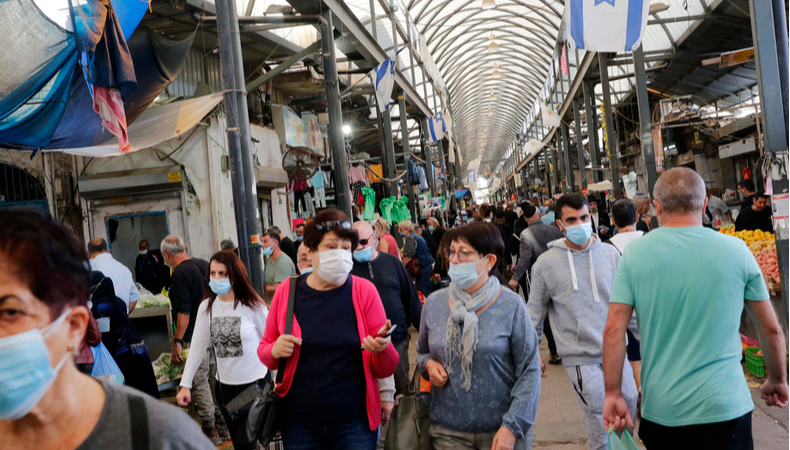Covid-19, Israel is a laboratory where the pandemic future is measured

Herd immunity will be difficult to achieve even with a large vaccination campaign, but Israel shows us how 55% of vaccinated people could be enough to reopen.
Israel is a laboratory where the future of the pandemic is measured: despite the differences between country and country, it is as if, looking at its example, we could move the calendar forward. Data published by the Israeli Ministry of Health shows that 4,649,654 people have been fully vaccinated against COVID-19 (two doses), more than half of the Israeli population, and about 550,000 have received the first dose. When the vaccinations began, Israel was in the midst of an epidemic wave, further aggravated by the massive spread of the English variant (more contagious and more lethal). To date, since the peak in mid-January, the results have been: 85% fewer daily deaths, 72% fewer daily critical illnesses, 86% fewer daily cases.
The rapid progress of the immunization campaign in Israel – over 50% of the population inoculated with both doses of Pfizer serum – has made possible numerous scientific studies on the effectiveness of the vaccine. New data published by the Israeli Ministry of Health in recent weeks have indicated 97% effectiveness in preventing symptomatic infections, in the probability of developing a serious disease, and in mortality. This is even better data than Pfizer published after the clinical tests – 95% documented at the time.
The reproduction rate (R number), which indicates the number of people each coronavirus patient infects on average without any means of protection, when the pandemic broke out and Israel had no restrictions, ranged between 2 and 3. And when the British variant arrived in the country before restrictions and vaccines, it fluctuated between 4 and 5. Currently, explains in the newspaper Haaretz Dvir Aran, the principal researcher of a biomedical data science laboratory at Technion, the Rt is at 0.6, and when drops below 1 means a 65% drop in cases per week: the epidemic dies down. The expert states: “Even if people stop wearing masks and go back to football stadiums, with this vaccination rate the R number will only increase to a maximum of 0.8 percent.”
Read more : Israel celebrates Easter and a newfound normality thanks to the anti-Covid vaccination campaign
The help of vaccines is not only in hospital wards (with the prevention of deaths and serious cases) but also concerns the spread of the infection. On Monday the news came from a study by the US Centers for Disease Control and Prevention: the Pfizer vaccine (also Moderna) used in Israel reduces transmission of the SARS-CoV-2 virus by 90 percent. In practice, mRNA vaccines clear the contagiousness of the virus. This is why even “only” 55% of the vaccinated population allows reopening.
The announcement now by the pharmaceutical company on the 100% efficacy of serum in clinical trials on children between the ages of 12 and 15 does not find Israel unprepared. Around 700 children in this age group have so far been vaccinated in the country. These are exceptional cases with previous diseases (mainly cystic fibrosis) that require the approval of a special commission. Among the children vaccinated to date, “no serious side effects have been found, and even mild ones are extremely rare,” said Boaz Lev, the head of the task force responsible for inoculation, quoted by the Guardian two weeks ago.
In recent weeks, Professor Ronny Gamzu, former super commissioner for the fight against Covid, had argued that the administration on children in Israel was proving effective and safe. 30% of the Israeli population is under the age of 16, so inoculating at least part of this age group is critical to achieving the goal of herd immunity.The director-general of the health ministry, Hezi Levi, said yesterday that, according to the results of Pfizer’s clinical tests, Israel will probably be ready to go ahead with the mass vaccination of children between the ages of 12 and 15 as early as May.
“These are very encouraging data,” professor Nadav Davidovitch, a member of the committee of experts that assists the government in the fight against Covid, told Repubblica. “In carrying out his research, Pzifer also looks at the data coming from all over the world, including Israel. It is important to specify that in Israel it is not a clinical test, with a control group, as has been experimented by Pfizer, but of emergency administration in cases particularly at risk “.
In Israel, almost everything is the same and the cases are steadily decreasing. Mass immunity has been achieved, which allows for the control of the pandemic and the return to a normal life. If all over 40s were vaccinated in other countries as well, and immunity of about 50 percent would be achieved (more, if the population were older). Although it is still far from herd immunity (for which it serves about 70-80% of the population) this number is sufficient to block the transmission and defend the subjects at risk with “indirect protection”, for which the unvaccinated defences because vaccinations and restrictions prevent the spread of the virus.
The director-general of the health ministry, Hezi Levi, said on Wednesday that, according to the results of Pfizer’s clinical tests, Israel will probably be ready to go ahead with the mass vaccination of children between the ages of 12 and 15 as early as May.“These are very encouraging data,” professor Nadav Davidovich, a member of the committee of experts that assists the government in the fight against Covid, said “In carrying out his research, Pfizer also looks at the data coming from all over the world, including Israel. It is important to specify that in Israel it is not a clinical test, with a control group, as has been experimented by Pfizer, but of emergency administration in cases particularly at risk”.




